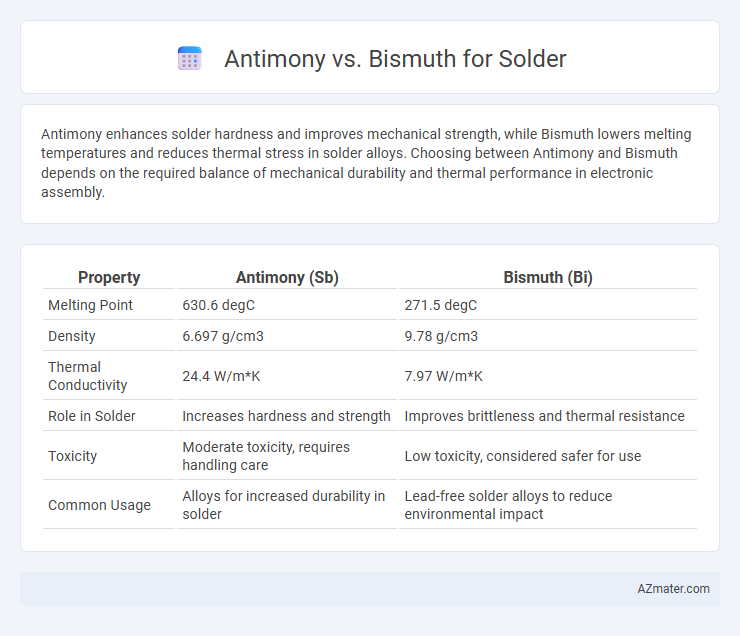Antimony enhances solder hardness and improves mechanical strength, while Bismuth lowers melting temperatures and reduces thermal stress in solder alloys. Choosing between Antimony and Bismuth depends on the required balance of mechanical durability and thermal performance in electronic assembly.
Table of Comparison
| Property | Antimony (Sb) | Bismuth (Bi) |
|---|---|---|
| Melting Point | 630.6 degC | 271.5 degC |
| Density | 6.697 g/cm3 | 9.78 g/cm3 |
| Thermal Conductivity | 24.4 W/m*K | 7.97 W/m*K |
| Role in Solder | Increases hardness and strength | Improves brittleness and thermal resistance |
| Toxicity | Moderate toxicity, requires handling care | Low toxicity, considered safer for use |
| Common Usage | Alloys for increased durability in solder | Lead-free solder alloys to reduce environmental impact |
Introduction to Solder Alloys: Antimony and Bismuth
Antimony and bismuth are critical elements in solder alloys, influencing melting point and mechanical properties. Antimony enhances alloy strength and wear resistance, making it suitable for high-stress electrical connections. Bismuth lowers melting temperature and improves thermal fatigue resistance, ideal for temperature-sensitive electronic components.
Chemical and Physical Properties Comparison
Antimony and bismuth exhibit distinct chemical and physical properties that influence their suitability for solder applications. Antimony has a higher melting point (630.6degC) and greater hardness, enhancing solder joint strength and thermal stability, whereas bismuth melts at 271.4degC, offering low toxicity and excellent wetting properties but lower mechanical strength. The chemical inertness of bismuth reduces corrosion risk, while antimony's brittleness may impact solder ductility under thermal cycling conditions.
Melting Points and Temperature Behavior
Antimony has a melting point of approximately 630.6degC, while bismuth melts at about 271.4degC, making bismuth significantly lower in melting temperature and more suitable for low-temperature solder applications. In solder alloys, antimony improves mechanical strength and creep resistance at elevated temperatures, whereas bismuth enhances wetting and reduces melting temperature without compromising joint reliability. Temperature behavior of antimony-based solders tends to favor high-temperature stability, while bismuth-based solders enable safer thermal profiles in delicate electronic assemblies.
Mechanical Strength and Durability
Antimony enhances solder alloys by significantly increasing mechanical strength and wear resistance, making it ideal for high-stress applications. Bismuth, while lowering melting points and improving thermal fatigue resistance, generally offers less mechanical strength compared to antimony-infused solders. The combination of antimony provides superior durability in electronic joints subject to mechanical strain, whereas bismuth is preferred for delicate assemblies requiring lower heat exposure.
Electrical Conductivity and Performance
Antimony and Bismuth both influence solder performance but differ significantly in electrical conductivity; Antimony offers higher electrical conductivity, enhancing signal integrity in electronic connections. Bismuth, while having lower conductivity, improves solder's brittleness and oxidation resistance, contributing to mechanical reliability rather than electrical performance. Choosing between Antimony and Bismuth in solder alloys depends on the specific application requirements for conductivity versus mechanical durability.
Environmental Impact and Safety Considerations
Antimony in solder raises environmental concerns due to its toxicity and potential bioaccumulation, posing risks to aquatic life and human health during manufacturing and disposal. Bismuth is considered a safer alternative, offering lower toxicity and greater environmental compatibility while maintaining effective soldering properties. Choosing bismuth-based solders helps reduce hazardous waste and workplace exposure, aligning with stricter environmental regulations and sustainability goals.
Compatibility with Lead-Free Solder Standards
Antimony enhances the mechanical strength and thermal fatigue resistance of lead-free solder alloys, making it compatible with common standards like RoHS and IPC J-STD-006. Bismuth lowers the melting point and improves wettability without compromising compliance with lead-free regulations, beneficial for sensitive electronic components. Both elements are effective additives in lead-free solder standards but are chosen based on specific application requirements such as thermal profiles and mechanical performance.
Applications and Industry Use Cases
Antimony enhances solder alloys by increasing hardness and thermal resistance, making it ideal for electronic components requiring durability under high temperatures, such as connectors and circuit boards in automotive and aerospace industries. Bismuth-based solders offer low melting points and non-toxicity, favored in medical device manufacturing and electronics assembly where eco-friendly, lead-free materials are essential. Both elements address different manufacturing needs: antimony improves mechanical strength in heavy-duty applications, while bismuth supports precision and environmental compliance in sensitive electronic and medical technologies.
Cost Analysis: Antimony vs Bismuth Solders
Antimony-based solders typically cost more due to the metal's higher market price and complex refining process, impacting overall production expenses. Bismuth solders offer a more cost-effective alternative with lower raw material costs and better abundance, reducing manufacturing costs significantly. Choosing between antimony and bismuth solders depends on balancing performance requirements with budget constraints, where bismuth generally provides a more economical solution.
Choosing the Right Solder: Key Considerations
Antimony enhances solder alloy strength and increases melting point, making it ideal for high-temperature electronic applications requiring durability. Bismuth lowers melting temperature and improves wetting properties, offering benefits for delicate components and lead-free solder options. Selecting the right solder depends on thermal requirements, mechanical strength, and compatibility with circuit materials to ensure reliable performance.

Infographic: Antimony vs Bismuth for Solder
 azmater.com
azmater.com